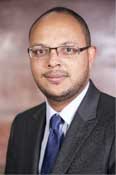 Dr. Luc Véchot is an Assistant Professor of Chemical Engineering at Texas A&M University at Qatar with responsibility for teaching and research on process safety related topics.
Dr. Luc Véchot is an Assistant Professor of Chemical Engineering at Texas A&M University at Qatar with responsibility for teaching and research on process safety related topics.
Prior to joining Texas A&M University, Dr. Véchot worked as a Process Safety Research Engineer at the Health and Safety Laboratory (UK HSE) for 4 years.
Dr. Véchot has worked on process safety related research topics for the last 9 years in collaborations with universities, public laboratories and industries. He has focused on exothermic reaction hazards, pressure relief design applications for reactive chemicals, accidental releases of water reactive chemicals, dust explosions and consequence analysis of LNG spills on land and water LNG.
Since July 2013, Dr. Véchot has served as the Managing Director of the Qatar branch of the Mary Kay O’Connor Process Safety Center. The center’s mission is to promote safety as second nature in the industry around the world with goals to prevent future accidents. The extension works to replicate the academic programs and activities of the center at the University’s main campus in College Station, Texas.
Dr Véchot received a Ph.D. in Chemical Engineering from Ecoles des Mines de Saint Etienne, France, in 2006.
Research
The Mary Kay O’Connor Process Safety Center (MKOPSC) – Qatar is leading a vibrant research program in close collaboration with the Qatar process industry on high relevance topics. The various research projects are funded by Industry (BP Global Gas SPU), the MKOPSC Qatar Consortium Members (QP, QAFAC, QAPCO, QCHEM, Qatargas, Rasgas, ConocoPhillips, Oxy Qatar, Qatar Shell, Exxon Mobil Research Qatar), and the Qatar National Research Funds (QNRF). The research activities are developed over four main research areas:
LNG Safety Research
MKOSPC has been very active in the area of LNG safety research for a decade with the support of BP Global Gas SPU, Qatar Petroleum, TEEX and QNRF. The research projects ($4M combined budget) aim to improve the knowledge on the phenomena involved in the spill of LNG on land or water, LNG vapor cloud control, mitigation of LNG vapor dispersion, and LNG pool fire radiant heat reduction. This work has included multiple field experiments on LNG vapor generation and dispersion and their modeling by computational fluid dynamics (CFD) simulations. One of the major outcomes of the LNG Safety Research projects in Qatar has been the design, construction, and use of the LNG Training Prop 5 of the Ras Laffan Emergency and Safety College, a unique state-of-the-art research facility allowing medium-scale LNG spill experiments on land and water.
Runaway Reactions and Calorimetry
MKOPSC has developed a laboratory in Qatar fully equipped to study the consequences of thermal explosion or runway reactions resulting from the loss of thermal control of a chemical reaction or decomposition of chemical compound/mixtures in a reactor vessel leading to its explosion. Research is carried out in collaboration with INERIS (FR), École Nationale Supérieure de Mines des Saint Etienne (FR), Health and Safety Laboratory (UK), Solvay (FR), University of Bologna (IT), and Shell (NL) to improve the vent sizing method for reactors containing an untempered chemical system (in particular peroxide systems) under runaway conditions.
Gas Dispersion Research
The steering committee of MKOPSC Qatar has recently (2014) decided to fund research on the infiltration of toxic gases in non-process areas. The objective of the research project is to develop an appropriate model of toxic gas ingress into buildings to help investigate likely mitigation strategies. This project will provide a technical basis for this comparison that includes consideration of potential H2S concentrations, air ingress, HVAC, human factors, and others.
Flammable Dust and Powder Explosion Hazards
The steering committee of MKOPSC Qatar has recently (2014) decided to fund research on the experimental and theoretical study of sulfur and polyethylene dust explosion hazards in the context of the Qatar industry. The objective is to generate a comprehensive study of the properties of polyethylene (LDPE/HDPE/MDPE/LLDPE) and sulfur dust explosion characteristics in the conditions relevant to their production and handling in Qatar. The outcomes of the project will be the assessment/development of specific safety guidelines for Qatar industry.
